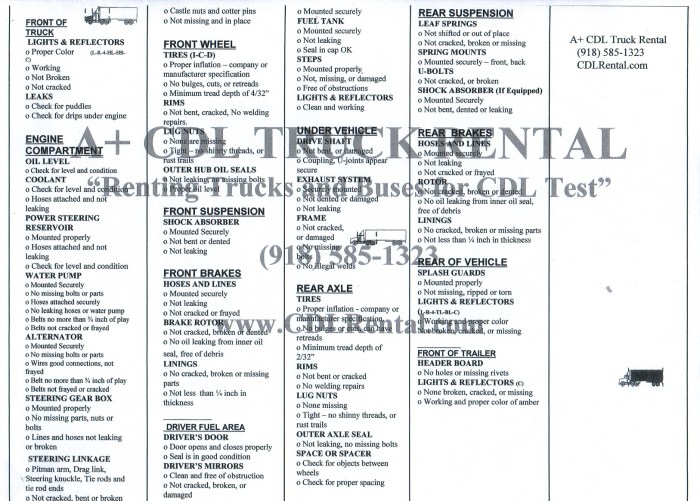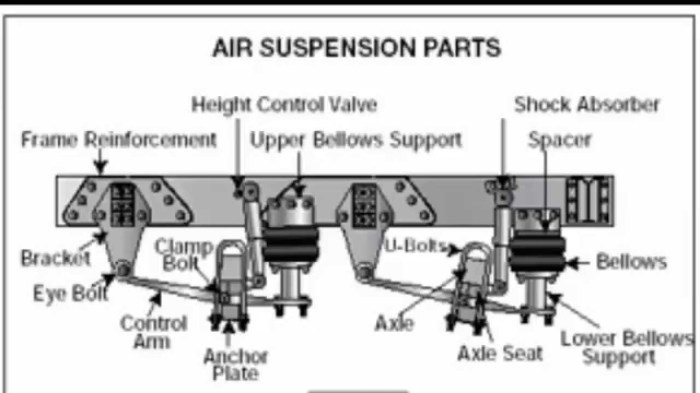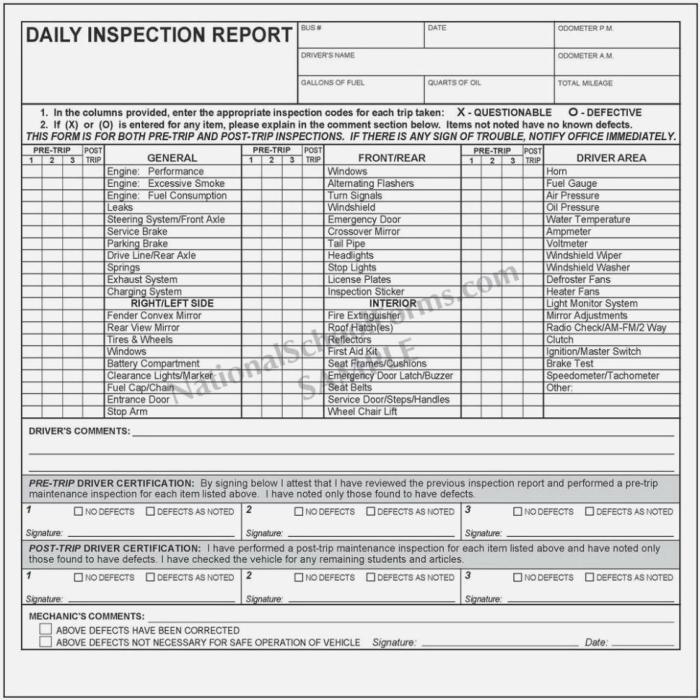Michigan cdl pre trip inspection checklist – The Michigan CDL Pre-Trip Inspection Checklist is a crucial legal requirement for commercial vehicle drivers, providing a comprehensive framework for ensuring the safety and compliance of their vehicles. By adhering to this checklist, drivers can proactively identify and address potential issues, minimizing the risk of accidents and ensuring the smooth operation of their vehicles.
This guide delves into the legal implications of pre-trip inspections, Artikels the step-by-step inspection procedure, and emphasizes the importance of documentation and reporting. It also explores the safety benefits of conducting thorough inspections and provides valuable tips and best practices for drivers.
Michigan CDL Pre-Trip Inspection Checklist: Legal Requirements

Commercial Driver’s License (CDL) drivers in Michigan are legally required to conduct thorough pre-trip inspections of their vehicles before operating them on public roads. These inspections help ensure the safety of drivers, passengers, and other road users by identifying and addressing any potential mechanical issues or defects.
Failure to conduct a pre-trip inspection can result in significant penalties, including fines, license suspensions, and even criminal charges in the event of an accident.
Inspection Procedure: Michigan Cdl Pre Trip Inspection Checklist
A thorough pre-trip inspection should cover all major components of the vehicle, including:
- Engine
- Brakes
- Tires
- Lights
- Steering
- Suspension
- Trailer (if applicable)
Each component should be inspected for any signs of damage, wear, or leaks. Drivers should also check fluid levels, tire pressure, and the overall condition of the vehicle.
Documentation and Reporting
It is crucial to document pre-trip inspections and report any defects or issues identified during the inspection.
Drivers should complete the required paperwork, including the Vehicle Inspection Report (VIR), and keep it in the vehicle for review by law enforcement officers or other authorized personnel.
Any defects or issues should be reported to the fleet manager or supervisor immediately for repair or maintenance.
Safety Considerations

Pre-trip inspections play a vital role in ensuring the safety of commercial vehicles and their drivers.
- Identifying and addressing potential mechanical issues can prevent accidents and breakdowns.
- Regular inspections help maintain the vehicle in good working order, reducing the risk of unexpected failures.
- Properly maintained vehicles are more fuel-efficient and environmentally friendly.
Training and Resources

CDL drivers can receive training on pre-trip inspections from various sources, including:
- Commercial driving schools
- Fleet safety managers
- Online courses and manuals
The Federal Motor Carrier Safety Administration (FMCSA) provides resources and guidance on pre-trip inspections, including the Commercial Driver’s License Manual and the Pre-Trip Inspection Guide.
Additional Tips and Best Practices
- Conduct pre-trip inspections in a well-lit and safe area.
- Use a checklist to ensure that all components are inspected thoroughly.
- Keep the vehicle clean and organized to make inspections easier.
- Stay up-to-date on vehicle maintenance and repairs.
- Report any defects or issues immediately for repair or maintenance.
Question Bank
What are the legal requirements for CDL drivers in Michigan regarding pre-trip inspections?
CDL drivers in Michigan are legally required to conduct a thorough pre-trip inspection of their commercial vehicle before operating it. Failure to comply with this requirement can result in penalties, including fines and loss of driving privileges.
What are the key components inspected during a pre-trip inspection?
A comprehensive pre-trip inspection covers all major components of the vehicle, including the engine, brakes, tires, lights, steering system, and fluid levels. Each component is inspected for proper operation, leaks, damage, or other issues that could affect the safe operation of the vehicle.
Why is it important to document pre-trip inspections?
Documenting pre-trip inspections provides a record of the vehicle’s condition before it was operated. This documentation can be used as evidence of compliance with legal requirements and can also help identify trends or patterns that may indicate potential maintenance issues.